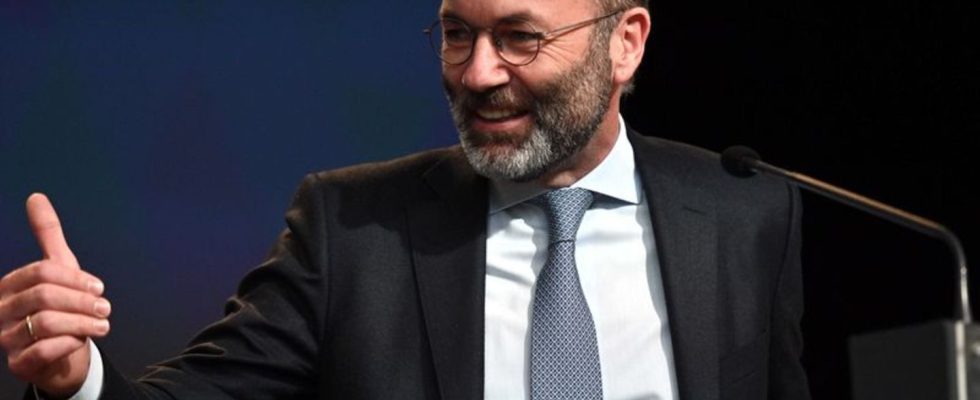migration
Asylum policy: EPP boss calls on EU states to unite
Manfred Weber, chairman of the European People’s Party, warns of a “breach of duty towards our citizens” with regard to the asylum debate in the EU. photo
© Jan-Philipp Strobel/dpa
Tomorrow the EU interior ministers will discuss the controversial reform of the EU asylum system. But shortly before that, the positions are far apart – even within the traffic light coalition.
Shortly before important EU consultations on possible stricter asylum rules, the head of the EPP, Martin Weber, called on the EU states to unite.
At tomorrow’s meeting of EU interior ministers, the countries should agree on a common position in order to be able to start negotiations on reforming the Dublin rules and asylum procedures. If they didn’t do this, “it would be a breach of duty towards our citizens,” Weber told the “Rheinische Post”. The traffic light coalition must quickly work towards a solution to the problems, “but in reality the opposite is happening,” said the CSU politician.
Baerbock: border procedures highly problematic
In Luxembourg, the EU interior ministers are discussing the reform of the Common European Asylum System (CEAS), which has been controversial for years. Among other things, it is about the question of whether there should be preliminary checks on asylum applications at the EU’s external borders. The federal government has shown itself open to this, but wants to ensure that minors under the age of 18 and families with children do not have to go through these procedures.
Foreign Minister Annalena Baerbock and Economics Minister Robert Habeck (both Greens) made similar statements. Baerbock said that border procedures are highly problematic – but the EU Commission’s proposal is the only chance to come to an “orderly and humane distribution procedure” in the foreseeable future.
It was unclear until recently whether the interior ministers would really be able to decide on a position for negotiations with the EU Parliament tomorrow. It is also conceivable that the negotiations will have to be continued again.
Weber: Exception for minors encourages smugglers
Regarding the demand by the Greens and the SPD to exclude minors between the ages of 12 and 17 from the planned border procedures, Weber explained: “Smugglers are encouraged to target families and younger people because they have a de facto guarantee of staying in Europe to be able to.” This means that young people are “not protected, but increasingly endangered”.
The FDP is against this demand. She fears that this could jeopardize an agreement in Europe. Even within the Greens there is criticism of the reform and the course of their own top staff.
Criticism of the reform project also came from the SPD. SPD MEP Birgit Sippel told the “Frankfurter Rundschau” that the past few years had clearly shown that asylum centers on the external borders mostly did not meet EU standards. One cannot hope that EU-wide mandatory fast-track asylum procedures at the external borders “will correspond to our procedural and human rights standards, especially since the fast-track procedures are always accompanied by imprisonment for up to almost half a year.”
MEP: EU plans extremely questionable in terms of human rights
Green MEP Erik Marquardt considers the EU plans to be unconstitutional. The possibility of returning people before a court has decided on their applications is extremely questionable in terms of human rights, he told the editorial network Germany (RND). It is also questionable to regard third countries as safe if they are actually only partially safe. “Both would be a strong encroachment on the right to asylum and no longer covered by the Basic Law and EU fundamental rights.”
The German counties, on the other hand, welcomed the plans. It is right to introduce border procedures at the EU’s external borders for certain groups of people and to set up centers, said the President of the German District Association, Reinhard Sager, to the newspapers of the Funke media group. “Asylum seekers whose application is rejected must be returned immediately.” Recognized asylum seekers and those whose applications cannot be finally processed there should, on the other hand, be evenly distributed among the EU member states according to “a fair key”.
ÖVP politicians: Only ready for limited solidarity
The Austrian Minister of the Interior, Gerhard Karner (ÖVP), stated that he was only willing to show limited solidarity in the distribution of refugees. “The asylum pact must take into account that Austria is extremely burdened with asylum applications and cannot show solidarity to member states that are less burdened. We expect solidarity from others,” he told the “Welt”.
The background to the EU consultations is the increased number of migrants. For months, many have been trying to reach southern Italy from North Africa via the Mediterranean. According to information from Rome, more than 50,000 migrants have come to Italy on boats since January. In Germany, the Federal Office for Migration and Refugees received a good 100,000 initial asylum applications in the first four months of this year, an increase of around 78 percent.

